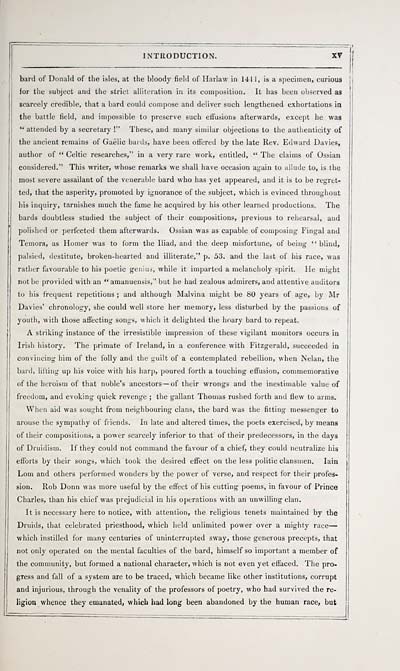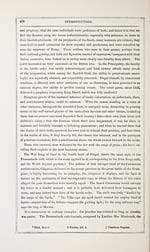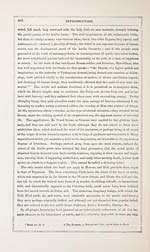Blair Collection > Sar-obair nam bard gaelach, or, The beauties of Gaelic poetry, and lives of the Highland bards
(25)
Download files
Complete book:
Individual page:
Thumbnail gallery: Grid view | List view

INTRODUCTION.
bard of Donald of the isles, at the bloody field of Harlaw in 141 1, is a specimen, curious
for the subject and the strict alliteration in its composition. It has been observed as
scarcely credible, that a bard could compose and deliver such lengthened exhortations in
the battle field, and impossible to preserve such effusions afterwards, except he was
" attended by a secretary !" These, and many similar objections to the authenticity of
the ancient remains of Gaelic bards, have been offered by the late Rev. Edward Davies,
author of " Celtic researches," in a very rare work, entitled, " The claims of Ossian
considered." This writer, whose remarks we shall have occasion again to allude to, is the
most severe assailant of the venerable bard who has yet appeared, and it is to be regret-
ted, that the asperity, promoted by ignorance of the subject, which is evinced throughout
his inquiry, tarnishes much the fame he acquired by his other learned productions. The
bards doubtless studied the subject of their compositions, previous to rehearsal, and
polished or perfected them afterwards. Ossian was as capable of composing Fingal and
Temora, as Homer was to form the Iliad, and the deep misfortune, of being " blind,
palsied, destitute, broken-hearted and illiterate," p. 53. and the last of his race, was
ratlier favourable to his poetic genius, while it imparted a melancholy spirit. He might
not be provided with an "amanuensis," but he had zealous admirers, and attentive auditors
to his frequent repetitions ; and although Malvina might be 80 years of age, by Mr
Davies' chronology, she could well store her memory, less disturbed by the passions of
youth, with those affecting songs, which it delighted tlie hoary bard to repeat.
A striking instance of the irresistible impression of these vigilant monitors occurs in
Irish history. The primate of Ireland, in a conference with Fitzgerald, succeeded in
convincing him of the folly and the guilt of a contemplated rebellion, when Nelan, the
bard, lifting up his voice with his harp, poured forth a touching effusion, commemorative
of the heroism of that noble's ancestors— of their wrongs and the inestimable value of
freedom, and evoking quick revenge ; the gallant Thomas rushed forth and flew to arms.
When aid was sought from neighbouring clans, the bard was the fitting messenger to
arouse the sympathy of friends. In late and altered times, the poets exercised, by means
of their compositions, a power scarcely inferior to that of their predecessors, in the days
of Druidism. If they could not command the favour of a chief, they could neutralize his
efforts by their songs, which took the desired effect on the less politic clansmen. Iain
Lorn and others performed wonders by the power of verse, and respect for their profes-
sion. Rob Donn was more useful by the effect of his cutting poems, in favour of Prince
Charles, than his chief was prejudicial in his operations with an unwilling clan.
It is necessary here to notice, with attention, the religious tenets maintained by the
Druids, that celebrated priesthood, which held unlimited power over a mighty race —
which instilled for many centuries of uninterrupted sway, those generous precepts, that
not only operated on the mental faculties of the bard, himself so important a member of
the community, but formed a national character, which is not even yet effaced. The pro-
gress and fall of a system are to be traced, which became like other institutions, corrupt
and injurious, through the venality of the professors of poetry, who had survived the re-
ligion whence they emanated, which bad long been abandoned by the human race, but
bard of Donald of the isles, at the bloody field of Harlaw in 141 1, is a specimen, curious
for the subject and the strict alliteration in its composition. It has been observed as
scarcely credible, that a bard could compose and deliver such lengthened exhortations in
the battle field, and impossible to preserve such effusions afterwards, except he was
" attended by a secretary !" These, and many similar objections to the authenticity of
the ancient remains of Gaelic bards, have been offered by the late Rev. Edward Davies,
author of " Celtic researches," in a very rare work, entitled, " The claims of Ossian
considered." This writer, whose remarks we shall have occasion again to allude to, is the
most severe assailant of the venerable bard who has yet appeared, and it is to be regret-
ted, that the asperity, promoted by ignorance of the subject, which is evinced throughout
his inquiry, tarnishes much the fame he acquired by his other learned productions. The
bards doubtless studied the subject of their compositions, previous to rehearsal, and
polished or perfected them afterwards. Ossian was as capable of composing Fingal and
Temora, as Homer was to form the Iliad, and the deep misfortune, of being " blind,
palsied, destitute, broken-hearted and illiterate," p. 53. and the last of his race, was
ratlier favourable to his poetic genius, while it imparted a melancholy spirit. He might
not be provided with an "amanuensis," but he had zealous admirers, and attentive auditors
to his frequent repetitions ; and although Malvina might be 80 years of age, by Mr
Davies' chronology, she could well store her memory, less disturbed by the passions of
youth, with those affecting songs, which it delighted tlie hoary bard to repeat.
A striking instance of the irresistible impression of these vigilant monitors occurs in
Irish history. The primate of Ireland, in a conference with Fitzgerald, succeeded in
convincing him of the folly and the guilt of a contemplated rebellion, when Nelan, the
bard, lifting up his voice with his harp, poured forth a touching effusion, commemorative
of the heroism of that noble's ancestors— of their wrongs and the inestimable value of
freedom, and evoking quick revenge ; the gallant Thomas rushed forth and flew to arms.
When aid was sought from neighbouring clans, the bard was the fitting messenger to
arouse the sympathy of friends. In late and altered times, the poets exercised, by means
of their compositions, a power scarcely inferior to that of their predecessors, in the days
of Druidism. If they could not command the favour of a chief, they could neutralize his
efforts by their songs, which took the desired effect on the less politic clansmen. Iain
Lorn and others performed wonders by the power of verse, and respect for their profes-
sion. Rob Donn was more useful by the effect of his cutting poems, in favour of Prince
Charles, than his chief was prejudicial in his operations with an unwilling clan.
It is necessary here to notice, with attention, the religious tenets maintained by the
Druids, that celebrated priesthood, which held unlimited power over a mighty race —
which instilled for many centuries of uninterrupted sway, those generous precepts, that
not only operated on the mental faculties of the bard, himself so important a member of
the community, but formed a national character, which is not even yet effaced. The pro-
gress and fall of a system are to be traced, which became like other institutions, corrupt
and injurious, through the venality of the professors of poetry, who had survived the re-
ligion whence they emanated, which bad long been abandoned by the human race, but
Set display mode to: Large image | Transcription
Images and transcriptions on this page, including medium image downloads, may be used under the Creative Commons Attribution 4.0 International Licence unless otherwise stated. ![]()
| Early Gaelic Book Collections > Blair Collection > Sar-obair nam bard gaelach, or, The beauties of Gaelic poetry, and lives of the Highland bards > (25) |
|---|
| Permanent URL | https://digital.nls.uk/81868168 |
|---|
| Description | A selection of books from a collection of more than 500 titles, mostly on religious and literary topics. Also includes some material dealing with other Celtic languages and societies. Collection created towards the end of the 19th century by Lady Evelyn Stewart Murray. |
|---|
| Description | Selected items from five 'Special and Named Printed Collections'. Includes books in Gaelic and other Celtic languages, works about the Gaels, their languages, literature, culture and history. |
|---|

